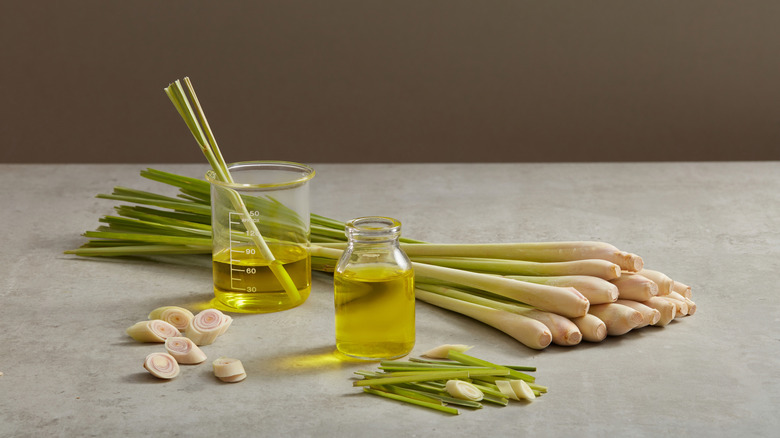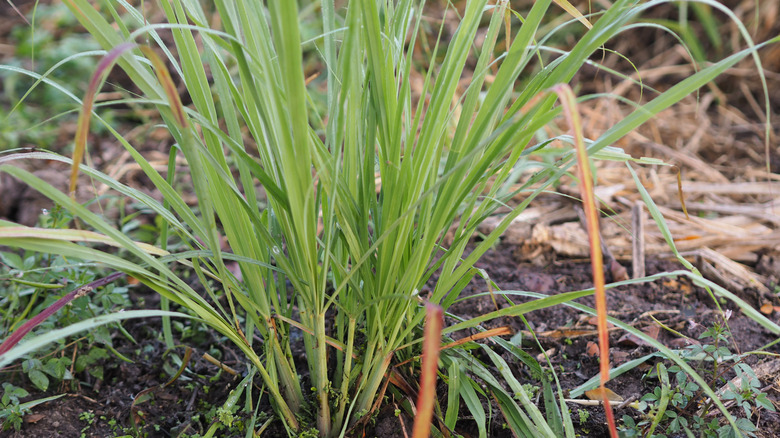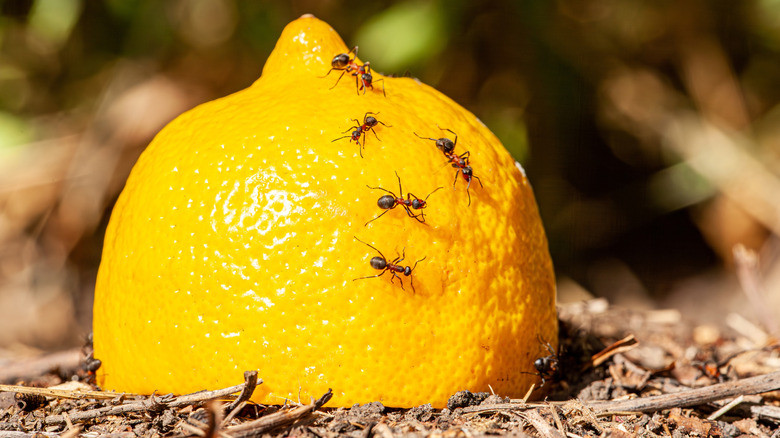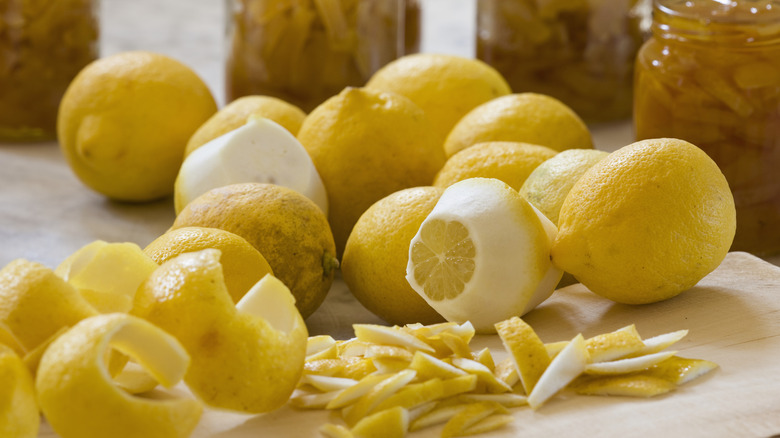4 Clever Lemon-Scented Hacks That Deter Pests (& 3 That Don't Actually Work)
If you want a pest-free home and garden, but you don't want to use harsh chemicals to make that happen, you might turn to more natural options. Lemons often come up in this space as their juice, scent, and rinds can be somewhat effective at keeping certain unwanted bugs away. While they're not as impactful or consistent as insecticides or chemical repellents, they're a good first step before escalating to stronger stuff. However, there is a lot of misinformation out there about what works and what doesn't. If you are on the fence about trying a hack, we uncovered whether it's worth your time or not.
To provide a breadth of value, these hacks actually cover all the different lemon-scented options, including lemons, lemon juice, and even lemongrass and associated oils. While lemons and lemongrass don't actually have too much in common, they do both contain limonene. This is the terpene (which is a naturally-occurring, strong-smelling substance) that's responsible for the lemon scent. With the help of an expert interviewed exclusively by House Digest, here are four clever lemon-scented hacks that deter pests and three that don't actually work.
Do: Use lemongrass oil to repel things like flies and mosquitoes
If you prefer to use a more natural insect repellent, consider using lemongrass oil instead of chemical-laden alternatives. "[A] lemon hack is to use oil of lemon eucalyptus, known as PMD," Licensed Pest Control Expert and Head of Customer Experience at Pestie, Becca Tellar, shares with House Digest exclusively. "Researchers at New Mexico State University found that the oil can be as effective at repelling mosquitos as DEET." While cinnamon oil, clove oil, and rosemary seem to work the longest, the study also cites lemongrass oil as a heavy contender to keeping mosquitoes away for at least 30 minutes per application. This is due to the insects aversion to the lemon scent. However, the study also notes that every essential oil is not created equally, and the ones you purchase might be different from the brand used, which, in this case, was Sigma-Aldrich.
The good news is that mosquitoes aren't the only pests that seem to dislike lemongrass oil. "The National Library of Medicine published a study [from peer-reviewed journal, Parasite] on stable flies where researchers tested the effectiveness of lemongrass oil at repelling flies," Tellar says. "They found that the flies spent less time in the zone where a pad treated with lemongrass oil was placed and concluded that it could be an effective stable fly repellent." While more studies are underway, if flies are driving you crazy while sitting on your patio, lemongrass oil can be part of the plan to maintain your peace. You can rub it on your wrists, neck, and any other exposed bits of skin to keep the pests away.
Don't: Plant lemongrass just to keep pests at bay
Since lemongrass oil is so effective as a pest repellent, you might think that the grass it comes from works just as well. This is a common misconception. You cannot simply plant lemongrass in your garden or in your window boxes and expect the smell of it to keep unwanted visitors from your yard. The rumor that it works likely comes from mixing up the plant itself and the oil in its distilled form. One is simply more powerful than the other. Another reason for the mix-up is that citronella and lemongrass are in the same plant family. Citronella is moderately effective as a repellent, especially against mosquitoes, but more experts agree that the lemongrass plant itself is best used in the kitchen and not as a hack that will keep insects out of your house.
There is a quick caveat to keep in mind, however, if you do decide to plant some lemongrass in your garden. It certainly smells fantastic to the human nose and can be nice to have around for ambiance and cooking, if you enjoy the flavor. However, be careful about who or what actually has access to it. "Lemongrass can be toxic to cats and dogs," Tellar warns. "So keep pets away and don't let them eat it." Perhaps place the grass in planter boxes that are higher off the ground, or up in a windowsill, if inside.
Do: Use lemon juice to trap and kill unwanted slugs
If you have a slug problem in your garden, you can use lemon juice as a part of a mixture that traps and drowns them. Slugs like ingesting sugar, so you should take a spoonful of sweet jam (any flavor is fine), white sugar, and lemon juice and mix it into a glass of water. Place as many of the cups as you need in the soil of your garden. The cups can be shallow, as their rim should be about one inch above the soil. However, they should still be deep enough so that once the slug falls in, it cannot climb back out. For this reason, you might need to partially bury the cups in the soil to get them at the right height.
The idea is that the sweetness of the mixture will entice the slugs to come and have a drink. Once they arrive, the high acidity of the lemon juice (with a pH between 2.00-2.60) will kill the animal. Much like vinegar, lemon juice is acidic enough that it's an ingredient that will control slugs and snails in the garden. While it's still unclear whether lemon juice is strong enough to dissolve slugs completely like salt or vinegar might, this method will still drown the slugs. Either way, they are gone and no longer a threat to your garden.
Don't: Think lemongrass alone is as effective as citronella
It's a common misconception that citronella products are made from the same lemongrass that is used for cooking. However, there are actually different types that can be used for different things. Grasses with the scientific names Cymbopogon flexuosus and C. citratus are what to look for if you want to plant something you can potentially use in your cooking. When you finely chop these grasses, you will smell lemon. As mentioned, this is because they contained limonene, which is a terpene also found in the fruit — hence their name of lemongrass.
The confusion starts because citronella grass that has the scientific name C. nardus is the plant many companies distill for use in insect sprays, candles, and the like. All these plants smell really similar and have almost the same name, so they are often mixed up. Finally, remember that even though C. nardus oil is used in pest-repelling products, the grass alone won't be enough to have any impact on the number of pests in your yard. When commercially prepared, the plant is highly processed to get it to the place where it will work effectively.
Do: Use lemon juice to get rid of ants
If you are having problems with ants in your house or yard, you can actually use lemon juice to get rid of them if you prefer not to use chemicals. In 2019, the Journal of Emerging Investigators published a study indicating that ants did their best to leave areas that forced them into close quarters with the juice. This study isn't alone in this finding, as in 2014 the International Journal of Novel Research in Interdisciplinary Studies also published similar findings. These researchers discovered that oils taken from lemon rinds were very effective at repelling, and sometimes even killing, carpenter ants.
For this reason, if you are struggling with any sort of ant coming into your kitchen, pantry, or even greenhouse, you could attempt to block their path by placing a few drops of lemon oil across their suspected entry point. If you aren't sure exactly where the ants are coming from (like a crack in the baseboards, etc.) you should look into placing a bit of lemon juice next to your door or window to block the pests from entering in a more general approach.
Don't: Use lemon oil to get rid of spiders
Since lemongrass oil seems to put off mosquitoes and flies, lemon oil must do the same for spiders, right? Unfortunately, while they both have limonene, this is wrong. Studies show that the oil doesn't impact spider behavior at all, so you can't use it to rid your yard or home of them. In a study published by the Journal of Economic Entomology, "Researchers at the University of Ulm in Germany tested three oils — lemon, peppermint, and chestnut — to see if they would repel three spider species: Latrodectus geometricus (the brown widow) and Steatoda grossa (both of the Theridiidae family) and Araneus diadematus (Araneidae family)," Tellar shares. "The findings ... [as shared on Entomology Today] ... were that lemon oil seemed to have no effect on the three species of spiders whatsoever."
While other species of spiders might react differently to lemon-scented deterrents, it is unlikely. Instead, you can get rid of spiders with other household staples. If you have Windex, you can spray it directly on the spider to kill it, as the ammonia and sodium dodecyl benzene sulfonate ingredients it contains are lethal to them. The same goes for a mixture that is ⅔ water and ⅓ bleach. The chemical compound in bleach is sodium hypochlorite, which kills bacteria, fungi, and viruses, and can act as a pesticide. Yet, the most humane way to rid your home of the occasional spider is simply to capture it in a cup and relocate it outside.
Do: Use lemon rinds if you don't have oil
This hack is based more on anecdotal evidence rather than scientific research. However, it is possible to keep bugs out of your home with a simple fruit trick. Instead of composting your lemon rinds after using the fruit, a popular TikTok hack suggests that the scent (again, due to the limonene) of the essential oils left over on lemon peels can work towards keeping all sorts of pests away from you.
The hack is simple. Just take the rinds and thoroughly rub them along your window sills, door frames, and anywhere else that you suspect pests might be entering your home. You'll need to press hard enough so that the oils from the peel transfer to the other surface. If you smell lemons strongly, you are likely doing it right. While the scent won't last long, it can last just enough time to make a small difference in the bugs you see in your space.







